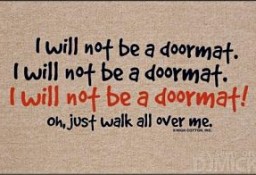We are creatures of habit because our brains make us that way!
Neuroscience shows that we are motivated to achieve and maintain a comfort zone because our brains equate that state of equilibrium with survival.
It’s only natural to resist change because the brain is hard-wired to respond to any stimuli or situation that disturbs our equilibrium. That’s why every news broadcast starts off with a “bad news” story—to get our attention! Our brains become alert to this news of danger, crisis, or threat at a personal level.
Earthquake in Nepal! Should I take shelter? Tornado in Texas! Should I batten down the hatches? Murderous rampage in Colorado! Should I lock my doors? Unless you or a loved one is in close proximity to these events (very unlikely) then these stories do not really effect you in any practical way.
But we can’t help listening, our brains automatically tune it. Broadcasters know it, and they use it. Why do they want us to be alert for the news broadcast? Not because the news items really matter to us but because they want us to be alert for the advertising messages that pay for the news broadcasts! The news is not a public service but a commercial one. It is a very effective way to collect ears or eyes and sell them to advertisers.
For some of us, this is Communications 101. But, even knowing this, we still listen. So, think about how many tens of thousands of hours of conditioning we have been subject to through such messaging! Our brains, broadcasters, advertising messages—these are all powerful forces to contend with and should not be underestimated.
Is it any wonder then that the prospect of losing a job, or having to look for a job, or making a career change strikes fear into the heart of anyone? Talk about crisis! Alarm bells go off when that state of affairs is disturbed—our jobs and careers go to the very heart of personal safety and stability.
The psychology of motivation
Our brains are naturally lazy and default to operations that require less energy. You’ve probably noticed this when driving a car: learning to drive takes a lot of concentration and energy but once learned we drive without really thinking about it.
While neuroscience research proves that we are meant to get in a groove and stay there, life does not cooperate. We now live in a ‘risk’ society characterized by high unemployment and a steady increase in contingent labour in volatile workplaces. Whether we like it not, more of us will have to change our jobs, our careers, our lives more often. Choosing or being forced to make a career change activates a fear response because the brain knows it’s going to have to expend a lot of energy to survive.
So, what’s the best way to deal with all this? Neuroscience and the psychology of motivation tell us to undo what we’ve learned and build a new habit. But, left on our own, we individually default back to our habits. Did you know, for example, that only 1 of 9 coronary bypass patients adopts healthier day-to-day habits after their surgery?
Changing our lives is not easy but it’s always easier when we do it with others. I focus on helping my clients build new career habits because our brains are also hard-wired to build new skills (aren’t we amazing!).
The Zeigarnik Effect
There is a concept in psychology called the Zeigarnik effect which is the ability of humans to finish a task once they’ve started—our brains resolve the tension between the present and a desired future of completion. That’s why somebody can learn to walk again after a stroke with months of rehab in small steps…literally!
Same thing with job search or career change, we can build new habits, new skills, that move us closer to a goal. It’s not rocket science, anyone can do it! The key is motivation, i.e. the desire to walk again.
That is the purpose of a JobJoy Report: to give you the desire to make a career change, to see with clarity the specific jobs and work settings that will recognize, reward and motivate you for what comes naturally and effortlessly.
Turning that desire into reality means working three major components to motivation: activation, persistence, and intensity. Once a new career is identified, we move into that space with deliberate, intentional, systematic and effective actions.
But start small, take an action, evaluate the result to see if it moves you closer to your goal or not. If it doesn’t move you closer, then look to see what is to be learned from that action, if anything, and adjust. If it does move you closer to your goal then what is the next action to take?
Unlearning old habits, learning new skills, this is the rhythm of successful change.
We persist through inevitable challenges and setbacks that are just part of life. Anyone who has ever had a goal (like wanting to lose ten pounds or run a marathon) probably immediately realizes that simply having the desire to accomplish something is not enough. Achieving such a goal requires the ability to persist through obstacles and endurance, to keep going in spite of difficulties. But there are certain times during the process where you turn up the heat, bear down on your goal, do your utmost to accomplish your goal.
Of course, finding another job or career is more complicated than that and depends on a lot of other things but the point is this: anyone can do it if they want to. The key is in your motivation.












